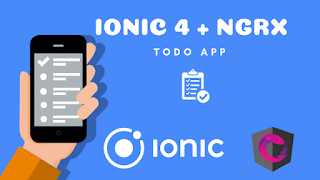Previously we implemented Geolocation and Geocoder plugins in Ionic 3 application, In this post, we will create an application in latest Ionic version 4 beta. Using Geolocation service we can get Lattitude, Longitude, Accuracy of location, Speed, Altitude etc of the device. After that Latitude and Longitude can be used to get Addresses available on these coordinates. To fetch address from coordinates of the device, we use Geocoder service.

Install the Cordova and Ionic Native plugins
Geolocation
Add this plugin in the application’s module file
in app.module.ts, import plugin and add in imports array.
In home.page.html, add following HTML
in home.page.ts file

Create a new Ionic Application
Install latest version of Ionic and Cordova CLI.$ npm install -g ionic cordovaNow we will create a new blank application
$ ionic start Ionic3Geolocation_Geocoder blankAfter the application is created, go to the root using the CD command
$ cd Ionic3Geolocation_Geocoder
Install the Cordova and Ionic Native plugins
Geolocation
$ ionic cordova plugin add cordova-plugin-geolocationGeocoder
$ npm install @ionic-native/geolocation
$ ionic cordova plugin add cordova-plugin-nativegeocoder
$ npm install @ionic-native/native-geocoder
Add this plugin in the application’s module file
in app.module.ts, import plugin and add in imports array.
import { NgModule } from '@angular/core';
import { BrowserModule } from '@angular/platform-browser';
import { RouteReuseStrategy } from '@angular/router';
import { IonicModule, IonicRouteStrategy } from '@ionic/angular';
import { SplashScreen } from '@ionic-native/splash-screen/ngx';
import { StatusBar } from '@ionic-native/status-bar/ngx';
import { AppComponent } from './app.component';
import { AppRoutingModule } from './app-routing.module';
import { Geolocation } from '@ionic-native/geolocation/ngx';
import { NativeGeocoder } from '@ionic-native/native-geocoder/ngx';
@NgModule({
declarations: [AppComponent],
entryComponents: [],
imports: [BrowserModule, IonicModule.forRoot(), AppRoutingModule],
providers: [
StatusBar,
SplashScreen,
Geolocation,
NativeGeocoder,
{ provide: RouteReuseStrategy, useClass: IonicRouteStrategy }
],
bootstrap: [AppComponent]
})
export class AppModule {}
In home.page.html, add following HTML
<ion-header>Update component with methods
<ion-toolbar>
<ion-title>
Ionic 4 Geolocation & Geocoder
</ion-title>
</ion-toolbar>
</ion-header>
<ion-content padding>
<h1>Get Location</h1>
<ion-button (click)="getGeolocation()">
Get Location
</ion-button>
<ion-button (click)="watchLocation()">
Watch Location Updates
</ion-button>
<ion-button (click)="stopLocationWatch()">
Stop Location Watch
</ion-button>
<div *ngIf="geoLatitude">
<p>Latitude : {{geoLatitude}}</p>
<p>Longitude : {{geoLongitude}}</p>
<p>Accuracy : {{geoAccuracy}}</p>
<p class="address-text">
<span class="watch-text" *ngIf="isWatching; else notWatching">
Watching Location
</span>
<ng-template #notWatching>
Location Watch Stopped
</ng-template>
<br>Address : {{geoAddress }}
</p>
</div>
</ion-content>
in home.page.ts file
import { Component } from '@angular/core';CSS styling in home.page.scss
import { Geolocation } from '@ionic-native/geolocation/ngx';
import { NativeGeocoder,NativeGeocoderOptions,NativeGeocoderReverseResult } from '@ionic-native/native-geocoder/ngx';
@Component({
selector: 'app-home',
templateUrl: 'home.page.html',
styleUrls: ['home.page.scss'],
})
export class HomePage {
geoLatitude: number;
geoLongitude: number;
geoAccuracy:number;
geoAddress: string;
watchLocationUpdates:any;
loading:any;
isWatching:boolean;
//Geocoder configuration
geoencoderOptions: NativeGeocoderOptions = {
useLocale: true,
maxResults: 5
};
constructor(
private geolocation: Geolocation,
private nativeGeocoder: NativeGeocoder
) {
}
//Get current coordinates of device
getGeolocation(){
this.geolocation.getCurrentPosition().then((resp) => {
this.geoLatitude = resp.coords.latitude;
this.geoLongitude = resp.coords.longitude;
this.geoAccuracy = resp.coords.accuracy;
this.getGeoencoder(this.geoLatitude,this.geoLongitude);
}).catch((error) => {
alert('Error getting location'+ JSON.stringify(error));
});
}
//geocoder method to fetch address from coordinates passed as arguments
getGeoencoder(latitude,longitude){
this.nativeGeocoder.reverseGeocode(latitude, longitude, this.geoencoderOptions)
.then((result: NativeGeocoderReverseResult[]) => {
this.geoAddress = this.generateAddress(result[0]);
})
.catch((error: any) => {
alert('Error getting location'+ JSON.stringify(error));
});
}
//Return Comma saperated address
generateAddress(addressObj){
let obj = [];
let address = "";
for (let key in addressObj) {
obj.push(addressObj[key]);
}
obj.reverse();
for (let val in obj) {
if(obj[val].length)
address += obj[val]+', ';
}
return address.slice(0, -2);
}
//Start location update watch
watchLocation(){
this.isWatching = true;
this.watchLocationUpdates = this.geolocation.watchPosition();
this.watchLocationUpdates.subscribe((resp) => {
this.geoLatitude = resp.coords.latitude;
this.geoLongitude = resp.coords.longitude;
this.getGeoencoder(this.geoLatitude,this.geoLongitude);
});
}
//Stop location update watch
stopLocationWatch(){
this.isWatching = false;
this.watchLocationUpdates.unsubscribe();
}
}
page-home {
.address-text{
text-align: center;
font-size: 20px;
}
.watch-text{
font-size: 18px;
}
}


No comments:
Post a Comment